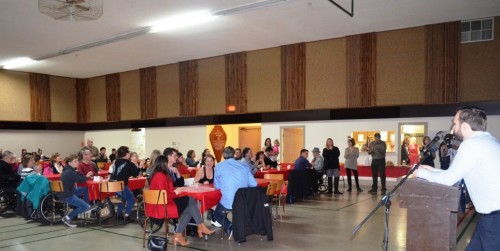By Lissa Miles
Wendy Duke was given an award in the fall for outstanding contributions in the field by the BC Association of Speech and Language Pathologists and Audiologists.
“I think of it as acknowledgment that I’m now an old fart,” joked Duke, during an interview at her office on Broadway, overlooking Vancouver’s spectacular skyline. “But it’s a bit of a validation of the important role of private practice in the field.”
Wendy Duke was given an award in the fall for outstanding contributions in the field by the BC Association of Speech and Language Pathologists and Audiologists.
“I think of it as acknowledgment that I’m now an old fart,” joked Duke, during an interview at her office on Broadway, overlooking Vancouver’s spectacular skyline. “But it’s a bit of a validation of the important role of private practice in the field.”
“There have been so many rewards for me being part of this field,” said Duke. “On top of the privilege of working with so many inspiring people, I’ve participated in raising the profile of speech pathology in British Columbia.”
She said private practice and billing for services was awkward and somewhat frowned upon in the health system when she started. Now, it is standard practice to contract work to a private practitioner.
Approximately 32 years ago Duke entered the field of Speech Pathology when a girlfriend dragged her along to UBC for vocational testing, where Duke rated high for speech pathology. Soon after, when she happened to flip through a linguistics text book while helping a friend with her school work, Duke was fascinated by the subject matter around language and communication.
She earned her masters degree in speech pathology and worked initially at G.F. Strong, Surrey Hospital and VGH.
Duke started her private practice in 1987 because she wanted to be the author of her own destiny. She also recognized that some people fall through the cracks in the system and need to be able to access help.
“I was particularly interested in working with people with brain injuries because of the challenges with communication. Depending on which area of the brain is affected, you’ll see such a variety of linguistic and neurogenic problems.”
Duke said the ’80s brought a lot of change in her field because of seatbelt legislation and a general improved understanding of brain injury. Not only were more brain injuries occurring, but medical practitioners were learning how to diagnose a brain injury.
She attributes her success in private practice with her ability to surround herself with talented, competent people.
Duke, who teaches part time at UBC, said it’s a very exciting time to be entering the field of speech pathology because we know so much about the brain now.
“When I started, one of the reasons we did such a thorough assessment of an individual was because it would help the neurologist pinpoint the precise area of the brain that was likely affected.
“With neuroimaging, we now know conclusively what area of the brain is affected. We know so much about neuroplasticity, we have some amazing technology to help people compensate for cognitive skill at home, we work with voice output devises and we know the most effective ways to work with people. It’s incredible how scientific and precise the job has become.”

